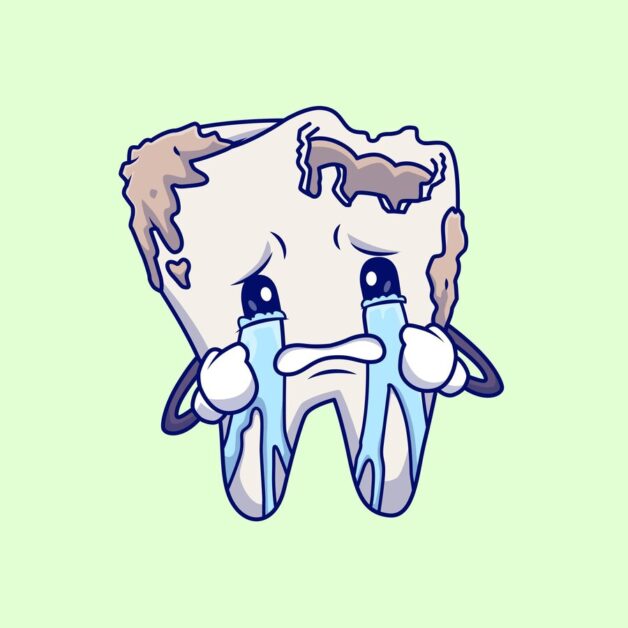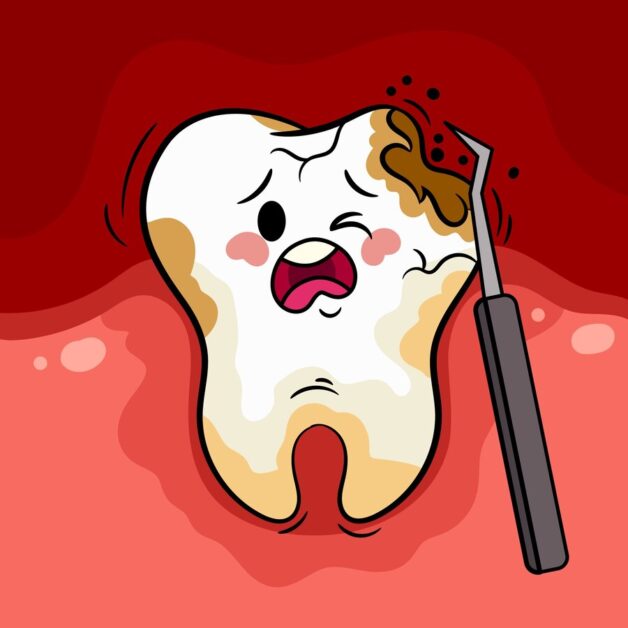This content is for informational and educational purposes only. Always consult a qualified healthcare provider.
Last Updated on April 18, 2024 by Grace Oluchi
A dead tooth is a tooth that has lost its vitality and is no longer receiving blood supply. This can happen due to trauma, decay, or infection. It’s important to address a dead tooth promptly to prevent complications like infection and abscess formation.
📋 Table of Contents
Key takeaway
How long can a dead tooth stay in your mouth
Signs
Causes
Treatment options
Dangers of keeping a dead tooth
How long can a dead tooth stay in your mouth?


A dead tooth can stay in your mouth for quite some time. It can remain inside your mouth for several months to years without causing immediate pain or problems. The exact time depends on the extent of the damage. However, keeping a dead tooth for a long time can have a major impact on oral health. This is why it is important to address it to prevent any potential issues. If a tooth is dead, it means the nerve inside has died, and it can become a breathing ground for bacteria.
Signs of a dead tooth
1 . Discoloration
The affected tooth may appear darker than the surrounding teeth, often turning yellow, gray, or black.
2 . Pain or discomfort
Initially, you may experience pain or sensitivity to hot or cold temperatures, biting or chewing, which may eventually subside as the nerve inside the tooth dies.
3 . Swelling or tenderness
In some cases, a dead tooth can lead to a dental abscess, causing swelling, tenderness, or a bump on the gums near the affected tooth.
4 . Bad taste or breath
An unpleasant taste or bad breath may develop due to the presence of bacteria and decay inside the dead tooth. You may notice a persistent bad taste or odor in your mouth.
5 . Change in tooth texture
The affected tooth may feel rough or develop a chalky texture due to decay and breakdown of tooth structure.
If you suspect you have a dead tooth or are experiencing any of these symptoms, it’s important to see a dentist immediately. A dentist can diagnose a dead tooth through a dental examination, dental X-rays, and vitality tests to determine the health and vitality of the tooth’s pulp.
Common causes of dead tooth
Trauma
A direct blow to the face or mouth, such as from a sports injury, fall, or accident, can lead to an injured tooth and damage the pulp, leading to its death.
Dental procedures
Sometimes, extensive dental work or procedures like fillings, crowns, or root canals can lead to complications that result in pulp damage or death. In rare cases, the dental work may inadvertently damage the pulp or introduce bacteria, leading to infection and pulp death.
Periodontal disease
Advanced gum disease or periodontitis, can cause infection to the tooth nerve, due to the roots being exposed, which makes them more susceptible to decay and infection.
Aging
As we age our teeth may naturally become more vulnerable and at risk of tooth decay, gum disease, nerve damage, and other dental issues. Also, as time goes by, it can contribute to the development of dead teeth over time.
Untreated cavities
When dental decay or cavities are left untreated, they can penetrate deep into the tooth, reaching the pulp tissue. Bacteria from decay can cause infection and inflammation, eventually killing the pulp.
Cracks or fractures
A cracked or fractured tooth can expose the pulp to bacteria, saliva, and food particles, which cause an infection and eventually lead to the death of the pulp.
Repetitive dental procedures
Many people don’t know this, but operating on the same tooth can increase the risk of pulp damage over time, especially if the tooth is already weakened or compromised m.
The habit of grinding one’s tooth
Some people have the habit of always grinding or clenching their teeth. And it’s bad for them and their oral health. Habitual tooth grinding can wear down the tooth enamel damage the nerve over time, and potentially lead to a dead tooth.
Genetic factors
Generics may play a role in oral health. Some people tend to suffer from tooth damage, which can lead to the death of a tooth.
Systemic health problems
Certain systemic health conditions or diseases, such as diabetes, can affect your dental health and increase the risk of tooth decay, gum disease, and pulp damage.
Treatment options for dead tooth
1 . Root canal therapy
This is the most common treatment for a dead tooth. It involves removing the dead of infected pulp from the tooth, cleaning the area, and sealing it to prevent further infection. It helps save the tooth and alleviate pain.
2 . Apicoectomy
If a root canal is not successful or the infection persists after initial treatment, an apicoectomy may be performed. In this surgical procedure, the tip of your tooth’s root (apex) is removed, along with any infected tissue, and the root end is sealed to prevent further infection.
3 . Extraction
In some cases where the tooth is severely damaged and cannot be saved, extraction (removal) may be necessary to prevent the spread of infection to surrounding teeth. However, after extraction, options for replacing the missing tooth may include dental implants, bridges, or partial dentures.
4 . Medication
Antibiotics may be prescribed to control or prevent infection, especially if there is an abscess or signs of systemic infection. Also, pain relievers or anti-inflammatory medications may be recommended to alleviate pain and inflammation.
5 . Dental crown
After a root canal, a dental crown is often placed over the treated tooth to protect it and restore its function and appearance.
6 . Monitoring
After treatment, regular follow-up appointments and dental X-rays may be necessary to monitor the healing process, ensure the infection is fully cleared, and evaluate the success of the treatment. Therefore, you are expected to regularly check in with your dentist to ensure everything is working smoothly.
Each of these treatments aims to address the dead tooth’s condition effectively, either by saving the tooth or preventing further complications.
Early diagnosis and treatment can help preserve the tooth, alleviate pain, prevent complications, and maintain optimal oral health. Regular dental check-ups and practicing good oral hygiene habits can help you detect and address dental issues before they progress and require more extensive treatment. As always prevention is better than… CURE.
The danger of keeping a dead tooth (Potential complications)
Keeping a dead tooth, also known as a non-vital tooth, without proper treatment can lead to several potential complications and risks to your oral health and overall well-being. Here are some of the potential complications associated with keeping it:
Infection
Keeping a dead tooth can become a source of persistent infection if bacteria continue to grow and multiply within the tooth and root canal system. This infection can spread to surrounding tissues, leading to gum disease, abscess formation, or systemic infections affecting other body parts.
Abscess formation
An untreated dead tooth can lead to a dental abscess, a pocket of pus caused by a bacterial infection. An abscess can cause swelling, pain, tenderness, and pus drainage, and if left untreated, it can lead to more serious complications such as the spread of infection to other parts of the body.
Tooth loss
Over time, the structure of a dead tooth can weaken and become more susceptible to fracture, cracking, or breaking. Without proper treatment, the tooth may eventually become non-restorable and require extraction. Oh, no one wants to have their tooth removed!
Spread of infection
If the infection spreads to adjacent tissues, it can lead to more serious health issues, such as sinusitis, osteomyelitis (bone infection), or cellulitis (soft tissue infection).
Pain and discomfort
Someone with a dead tooth can experience discomfort. It can cause them persistent or intermittent pain, sensitivity, and discomfort, especially when biting, chewing, or consuming hot or cold foods and beverages. Who doesn’t want to eat in peace ?!
Cosmetic concerns
A bad tooth may become discolored, turning yellow, gray, or black, which can affect your smile’s appearance and when this happens, some people say farewell to their self-confidence. No one wants to develop self-esteem issues due to their teeth, but sadly, some people do.
The cost is leaving a dead tooth is just too much, if you are reading this right now, and you suspect you have it, get help immediately. Don’t let it get so bad, to the point it puts your life at risk!
A message from Medspurs
It isn’t worth it. Allowing an oral health issue or any health condition to stay so long without being diagnosed by a healthcare professional is NOT WORTH IT. Many people tend to let things go too far, and that needs to change, things don’t have to become so bad before we believe it’s time to seek medical help. Because if you eventually seek help, and receive help, some damages may not be reversible.
Health awareness is key, which is why Medspurs is here for you. Medspurs wants you to get the best immediate health information and advice. We want you to be safe and healthy. As always, remember that you are in charge, and your health lies in your hands.
Enlighten yourself with these articles
When is it too late to reverse gum disease?
The Difference between Tooth Scaling and Root planing in 2024

